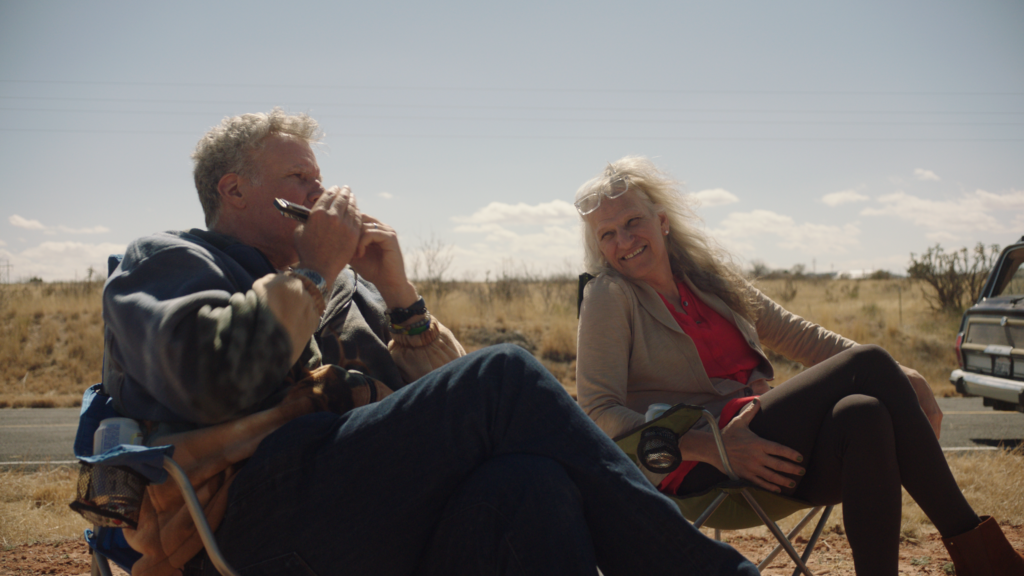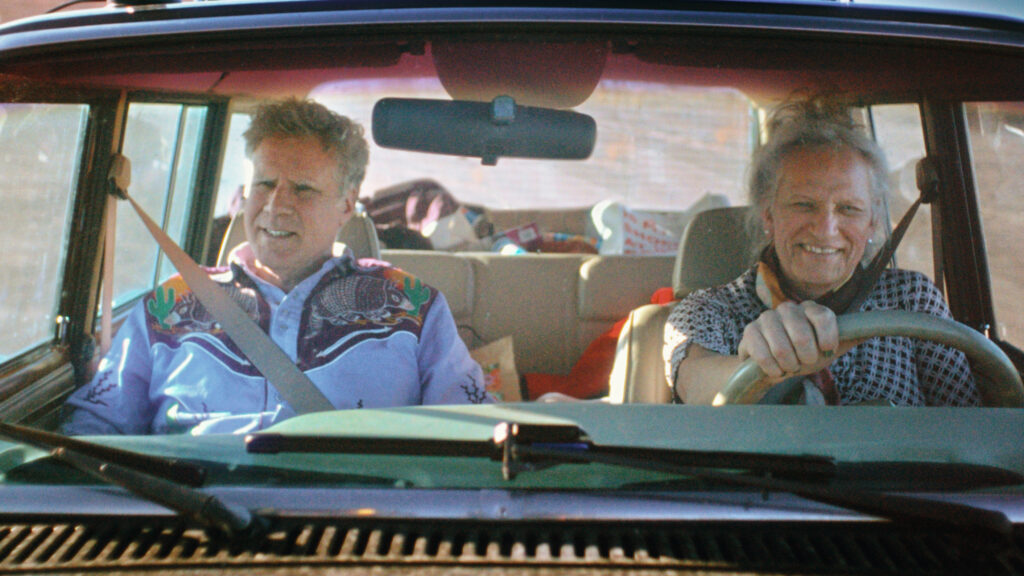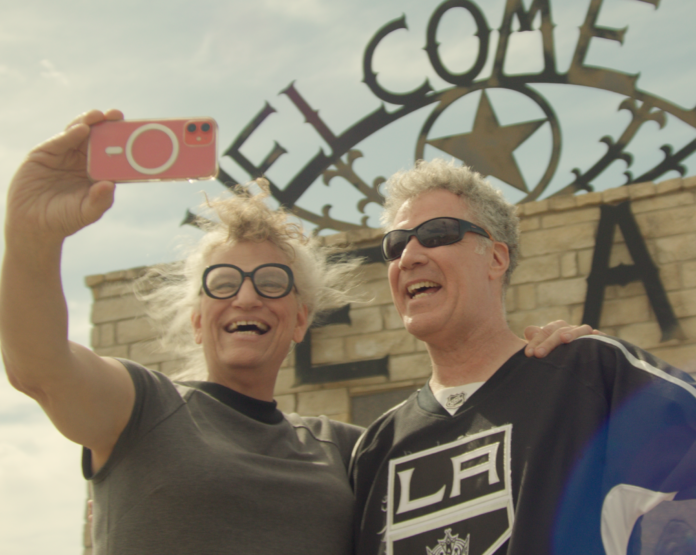The influence of softhearted straight male allies for the LGBTQ+ community is gaining momentum in the era of Tim Walz. We can now count universally beloved comic actor Will Ferrell among those heterosexual men who, confident in their own identities, use their platforms to support and uplift marginalized groups.
Ferrell leads by example in “Will & Harper,” a documentary that emerged after his friend of 30 years, Harper Steele, came out as transgender in 2021 after decades spent in the closet. Ferrell and Steele met while working on “Saturday Night Live” — Steele as head writer for four years, and Ferrell as a main cast member from 1995 until 2002. Eventually, the two worked together at Funny or Die, where Steele was creative director, and Ferrell acted in two films she co-wrote: the Spanish-language comedy-western “Casa de mi Padre” and 2020’s “Eurovision Song Contest: The Story of Fire Saga.”
Now, in “Will & Harper,” directed by Josh Greenbaum (“Barb and Star Go to Vista Del Mar”) and now available on Netflix, the two set out on a cross-country road trip, where Steele seeks to explore her identity in a country that doesn’t always embrace her.
“I love it so much,” she says early in the film about the U.S. “I just don’t know if it loves me back right now.”
Meanwhile, Ferrell, who told Variety earlier this year when the film debuted at Sundance that he had “zero knowledge” about the trans community, aims to deepen his understanding of his friend’s journey. On their own, the widespread appeal of Ferrell’s films such as “Old School,” “Anchorman: The Legend of Ron Burgundy” and “Step Brothers” suggests that “Will & Harper” could attract a diverse range of potential allies who may be unsure where to begin. If there’s a lesson here, it might be that allyship can start in something as simple as a station wagon.
In a video interview with Ferrell and Steele during the film’s premiere at the Toronto International Film Festival, Ferrell was genuinely moved just knowing he might make a difference. “Oh, that’s so nice,” he said, after I mentioned the significance of him being a queer-supportive straight guy who models sensitivity and unconditional love, admitting I felt like I was lacking men like him growing up.
But it was Steele who truly understood: “We all need a Will,” she added, leaning into her buddy during our interview, their decades of friendship on display in one brief, heartfelt embrace.

As of now, Will, how aware are you that this film might influence your fans’ perspectives and foster compassion toward trans individuals?
Will Ferrell: I think we’re getting a sense of that. I mean, it’s something, once Harper said, “OK, you know what? Let’s do it,” that was probably the second part of the conversation — that she articulated the fact this is something that will help [her], but she brought up the great point of exposing that part of my audience that maybe wouldn’t be inclined to even investigate anything like this. I think that’s really exciting. I think that’s really exciting that that is a potential. And yeah, I’ve already gotten feedback that, I would say, a surprising segment of my audience that you wouldn’t have thought would have any interest is really interested in watching this.
Considering how some of your fans may feel about the trans community, did it feel like a risk to make this film?
Harper Steele: I don’t think Will cares about that sort of risk. That’s what I think. I brought that up early. Again, I brought up many times that Will is a brand as well as a human being. Bud Light did not fare well when they associated themselves with a trans person. But I don’t think that enters into Will’s mindset at all, really.
Ferrell: This is the advantage when you’re at the tail end of your career and you’re just coasting. [Laughs.]
Steele: [Deadpans.] He wouldn’t have done it, I guess.
Ferrell: [Sarcastically joking] Oh, no. Even a year ago, two years ago, I wouldn’t have done it. I was hot! I think in the most healthy way, once I make a decision, I don’t look back. Whether that’s a bizarre comedic premise or, whatever it is, even in my day to day. This was another case of, OK, there’s going to be a positive response and a negative response. Whatever potential fallout that could be directed my way, I’m not really concerned. I’m not concerned at all.
To me, you are like the Tim Walz of cinema. We’ve got Will and we’ve got Tim standing up for the LGBTQ+ community. Harper, I was wondering if you could talk about how you feel about men like Will, and even Gov. Walz, both of whom embody a positive example of tender masculinity that challenges the traditional notions of toxic masculinity.
Steele: I’m not positive that it’s a new phenomenon. In fact, I almost think toxic masculinity is a newer phenomenon. I think people are threatened by trans people, by queer people, by women, and so this sort of toxic nature has grown a little bit out of this. I think the basic component is men who are not threatened by something they’re hiding themselves maybe, or something that they’re afraid of, or that is unknown. They are generally good people and they don’t either care about me or they’d like to meet me and talk to me. Almost all of the men in my life who are straight cis men are the kinds of people who are comfortable with being themselves. I’m not going to say this about every toxic male, that they’re not comfortable being themselves. I do think that that kind of mentality, as women’s rights grew and as more queer people became present, the unknown and the scariness of that seemed to ratchet up.
How do you think telling stories like this one can shape American attitudes toward trans individuals and potentially impact pro-trans versus anti-trans legislation?
Steele: For us, I think it’s just a hope. I’m not sure we are confident that we can. But for me personally, and I won’t speak for Will, to lead by example is the way to get to that change. I’m not super strident, though I can be. I think this is a great example of allyship. And it’s a funny movie, so maybe we can bring people in with that laughter and illustrate that allyship.
Ferrell: We talk about the email that Harper sent where she came out, and then there was a follow-up in which she said, “Look, I’m not a very political person, but just by nature of being trans, I’m now a political person in a way. I just ask you as my friends to stand up for me. Do your best to, if I’m misgendered, just speak up on my behalf, that’s all I ask.” This was the light bulb moment for me: “Oh, if I’m really going to walk the walk here, maybe this is a way to do that and we could have a great time, and it would also be educational for me.” Just be that — lead by example. Show that civility still exists out there, not only between ourselves, but in the way we’re engaging with the world.
If there were to be a sequel, where do you envision you’d go together next?
Ferrell: I mean, where do you want to go? Saint-Tropez or something?
Steele: Saint-Tropez, or I was thinking space.
Ferrell: Oh, space. Maybe space! Maybe we get stuck in space the same way these two astronauts’ eight-day trip has now turned into 80 days, or something like that.
Steele: Yeah, we’ll be up there.
Looking back on the beginning of your friendship, is there a specific “SNL” sketch that you both worked on together that significantly strengthened your bond and brought you closer together?
Steele: It’s a fraught environment. He was always fucking my sketches up.
Ferrell: On purpose. I [was] like, “I’m going to fix your wagon.”
Steele: I was like, “This dumb actor.” No. [Laughs.]
Ferrell: You have to remember, there’s so much failure on that show that the bonding really comes from trying stuff at the rewrite table and getting the laugh in the room, but the host hated it, so it never got picked.
Steele: Yeah, all the bonding happens with, like, “I love your sketch.” “I love yours.” Neither one of us is doing those sketches.
Ferrell: But let’s all go have a beer. I don’t think there was that lightbulb moment, that one sketch where we both were like, “That was so great.” But you get to know and trust and love each other through the process.


